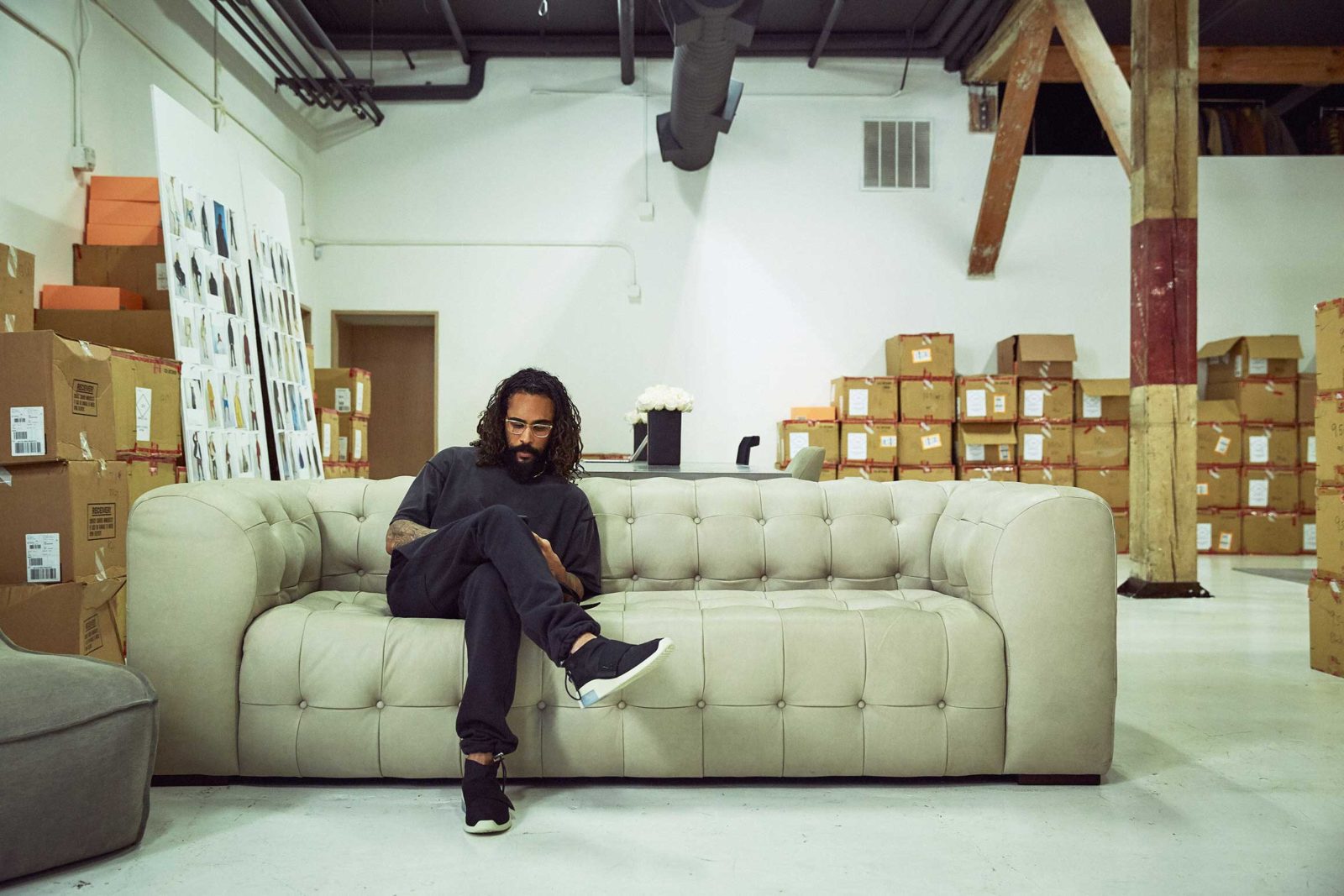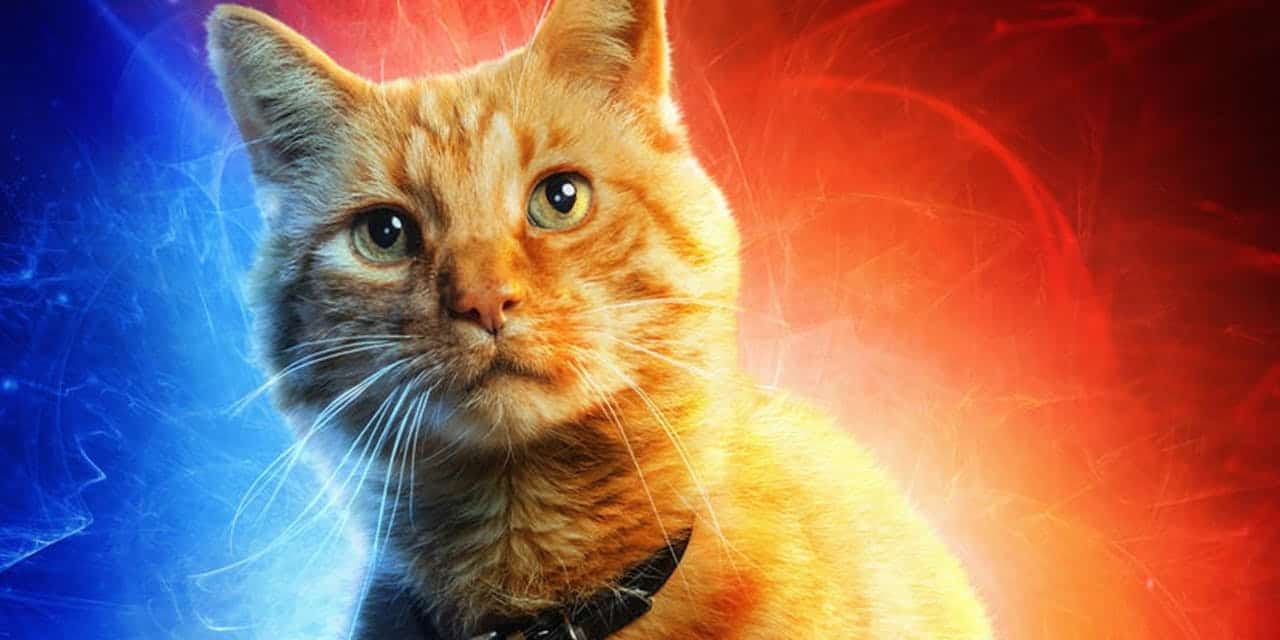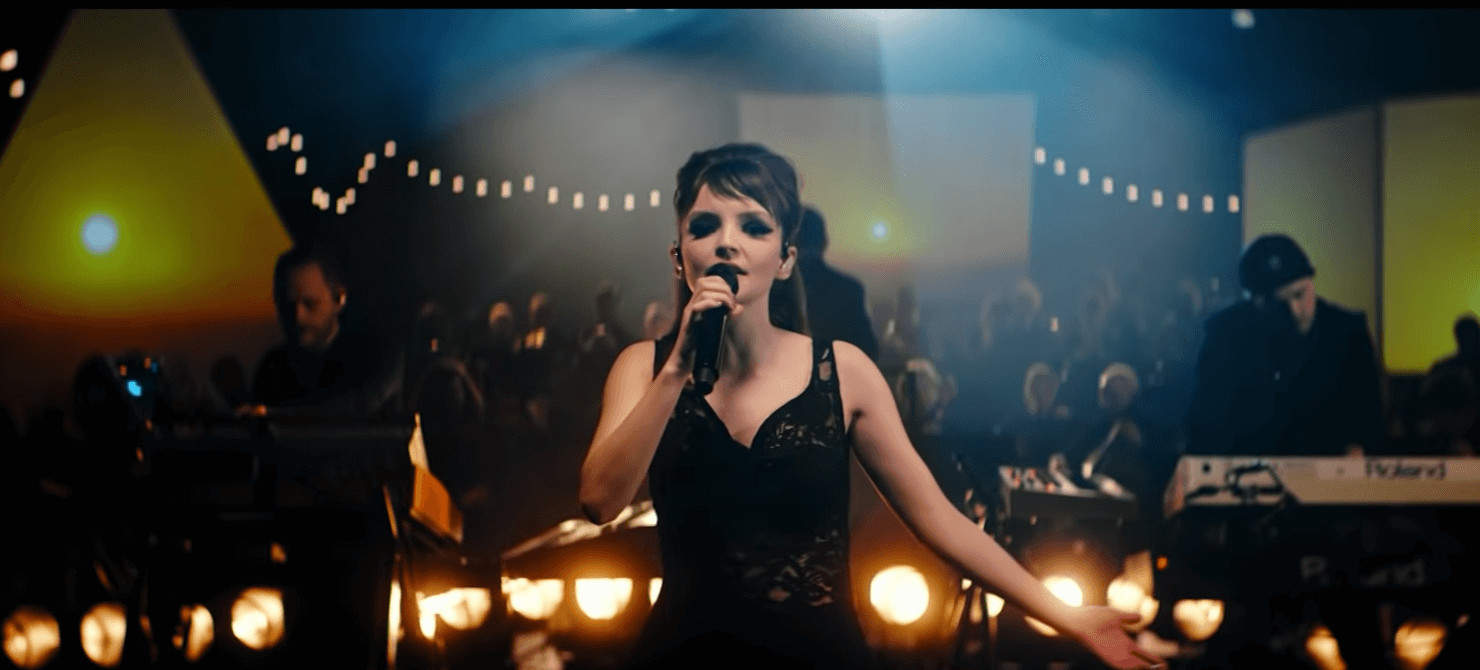
 EXCLUSIVE
EXCLUSIVE
Already a member? log in
NO COMMITMENT REQUIRED, CANCEL ANYTIME.
Fear of God’s offices aren’t what you would expect for one of the hottest fashion brands in the world. On a nondescript corner in Los Angeles’ Arts District, the brick building is completely unmarked. You have to text someone to figure out which door to use. “I’ll come meet you outside,” is the reply.
Maybe Fear of God is being discreet so fashionistas and sneakerheads don’t come knocking. Or maybe things are just so busy no staffers have noticed the lack of a sign on the door.
Inside the renovated industrial space, a small team works in controlled chaos. High-end, modern furniture is surrounded by hundreds of boxes stacked in the creative studio, turning what used to be the design space into a makeshift fulfillment center for a drop of the latest Nike collaboration.
The space is raw, yet refined. Expansive, yet packed. It’s the ultimate contrast of high-end and hustle, which might just be a perfect metaphor for the brand itself. That contrast is everywhere you look.
Take Fear of God’s founder, Jerry Lorenzo, for example. He is laid-back and effortlessly cool, but he is a perfectionist involved in every detail of the company.
He’s a self-taught designer who built the brand on his own, and now is one of the hottest names in high-end fashion. He wears sweats to Paris Fashion Week. And somehow he’s a playable athlete in the NBA 2K19 video game.
In the last five years, he has turned his penchant for ’90s-retro fashion into one of the hottest and most innovative fashion brands in the world. But perhaps most surprisingly, he is an outspoken Christian leading a revolution in the luxury marketplace.
“I think luxury is freedom,” Lorenzo says. “I come to work in sweats and hair looking crazy. That’s something that a lot of people can’t do. I’m operating in my freedom and the only boss I have is the greatest creative director of all time. And I’m OK with being His employee.”
Over the last few years, Fear of God has become the brand for luxe apparel gatekeepers, celebrities and trendsetters. You’ve seen the Fear of God Sixth Collection on everyone from Justin Bieber to LeBron James, Gigi Hadid to Kanye.
But it’s Lorenzo’s recent collaboration with Nike on a new line of basketball shoes that has taken things to an unprecedented level.

“I could have just done an old Nike shoe, but we fought to do something new,” he says of the Nike Air Fear of God 1. “What I’m really good at is shape and silhouette, and if I can help change the shape of a basketball shoe and I create a new shoe with Nike, we can maybe change culture together.”
He’s well on his way. When Nike debuted the shoe in December, it sold out in minutes. Despite being some of the priciest sneakers in history at $350 a pop, Nike was only able to fulfill 5 percent of the demand.
Lorenzo has bigger goals than just dressing celebrities and selling nice sneakers. He wants to use what he does to make an impact, and he wants people to know the real source of the high-end designs they’re wearing.
“I have to really know where the favor is coming from,” he says. “You can quickly get lost in thinking it’s your talents that got you somewhere, and that’s a scary place to be. Thinking it’s through your own will, or your own gifts, that you’re able to make these things happen, when the reality is it’s the opposite: It’s only through obedience.”
IN TWO WORLDS
When Jerry Lorenzo was a kid, his dad traveled a lot. A former Major League Baseball player, Jerry Manuel Sr. coached at both the major and minor league levels, leaving Jerry’s mother to shoulder a lot of the responsibility of raising five kids.
Though Lorenzo attended a mostly white high school with “grungy Kurt Cobain-type kids of the ’90s,” his mom would take him and his siblings to a mostly black church every Sunday.
I’m talking about a respect and a reverence, but if you don’t know that, it’s kind of gangster.
“I remember her being a rock of our family spiritually,” he says.
She would play praise music in the house, and every night at the dinner table the family would do devotions.
“It says in the Bible, ‘Raise a child up in the way that he should go, and he’ll never turn from it, and if he does turn, he’ll come back,’” he says. “I’ve had these spiritual roots in my life, in heavy part to my mom’s obedience and dedication to keeping us spiritually grounded.”
Lorenzo played baseball at Florida A&M University before getting his master’s degree in business administration at Loyola Marymount University. Even so, he felt like his job options were limited after graduation. He got a taste of the fashion industry working retail during college, but after school he took a different path.
“At that time, just being a young black kid and finishing grad school, I really thought my only chance at doing corporate America was doing whatever my dad did,” he says.
Lorenzo took a front office job with the Los Angeles Dodgers, where he met the team’s young phenom, Matt Kemp. At the time, not only was Kemp one of the league’s best players, he was also a nascent celebrity who briefly dated Rihanna. Soon, Lorenzo was doing marketing for the baseball star, which included upgrading his style.
“I kind of had this knack for knowing what was missing from [Kemp’s] closet,” Lorenzo says.
Lorenzo didn’t really set out to start a brand. The “humble beginnings” story is that he had ideas for pieces he wanted for Kemp’s—and his own— closet, but couldn’t find them in the stores.

“So I was like, ‘I’ll go downtown, and I’ll make it,’” he says. “I’ll figure it out. It can’t be that tough.”
A few pieces later, and he had a small collection. But it still wasn’t a brand, or even close.
Lorenzo’s focus was actually on the L.A. party scene. While working in management and marketing by day, by night he was throwing hugely successful parties, dubbed JL Nights, attended by the who’s who of L.A.’s scene.
It was in these rooms full of tastemakers and streetwear pioneers that something became clear: Lorenzo was consistently the best dressed guy in the room.
“I was like, ‘If you guys have clothing lines, I could probably have a clothing line,’” he says.
But Lorenzo’s lifestyle came at a steep cost to his personal life. Partying every night led to a drinking problem, and he stashed his faith in the backseat. He even decided to publicly change his last name from Manuel to Lorenzo to avoid any overlap with his father, the devout, respectable baseball manager.
Jerry “Lorenzo” had come a long way from the churchgoing kid who sat down for nightly devotions with his family, but that all changed during a trip to see his parents in Chicago. It was a trip that ended up having a ripple effect, not just on his own life, but also the fashion world.
THE MEANING OF ‘FEAR’
The Manuels do devotions as a family, so any trip Lorenzo took to check in with his parents meant a little prayer and Bible reading. At this point, Lorenzo was partying with a handful of the world’s most famous people and had designed a few items that would become staples of his fashion line. Professionally, things were coming together. Personally, well, his life wasn’t where he wanted it to be.
That’s when his parents read a passage from Oswald Chambers’ devotional classic My Utmost for His Highest that would change his life. The passage described God on a throne, wreathed in glory but surrounded by dark clouds. Dark and light.
“I just had this vision of God, and He kind of looked just like really cool for the first time,” Lorenzo says.
This wasn’t a Sunday school God. This wasn’t a corny, Christian bookstore depiction. This was an all-powerful God who demanded respect and should be feared by those who oppose Him.
“In my mind, I was like, ‘Oh my God, this is a good foundation to build this clothing line on: the fear of God,’” he says. “When you’re in relationship with Him, you’re at peace with Him. But if you’re not in relationship, you see those clouds and darkness as literal clouds of darkness, and there’s like a literal fear. I was like, ‘Man, I’ve got this foundation I could build a brand on.’”
Something about the idea of the fear of God—a God who could burst through the darkness like Chambers described— sparked something. “I’m not talking about real fear,” he explains. “I’m talking about a respect and a reverence, but if you don’t know that, it’s kind of gangster.”
But I can’t afford to compromise my perspective for price. I think God has called us to excellence.
The Fear of God name stuck. It was cool whether you knew what it meant.
“I knew that it was gangster enough to overcome the Christian connotation,” he explains. He knows that if he’d started the brand in a more traditionally Christian environment like Nashville or Colorado Springs, he would have gotten labeled as the Christian designer (“It would have been DC Talk,” he cracks).
But in L.A., it was different. It was a little weird, a little punk. And sure, it was cool. But for Lorenzo, it wasn’t just cool. It was a spiritual wake-up call.
He wasn’t just out to make good-looking clothes anymore. He was being obedient to a creative calling.
“Fear of God just gave me this foundation that I needed,” he says. “There was the conviction that I knew there was something missing in the market, and there was also a conviction that I needed a platform to honor Him. This is something that, even if it doesn’t work, at least I’m honoring God through this.”
Not long after, those initial pieces caught the eye of Big Sean and other high-profile figures in the hip-hop world. And that led to a call from fashion/rap titan Kanye West, who asked for a few Fear of God shirts of his own.
“Kanye got a hold of it,” Lorenzo says. “He and I had never connected, but all of his close friends were really good friends of mine. He’s like, ‘Man this is amazing! Can you be in Paris next week?’”
Lorenzo was in Paris next week.
The meeting led to a three-year collaboration with West. Soon after, Lorenzo was designing high-end tour apparel for the likes of Jay-Z, Kendrick Lamar and Justin Bieber.

Lorenzo was quickly becoming one of the most talked-about figures in fashion, and as his personal profile grew, so did his initial conviction to honor the God he “feared.” The brand gave him more fame but also more access to his vices.
“I had a brand called Fear of God, and I had an alcohol problem, and I was living these two different lives,” he says. “I was just like, ‘You know what, God, if you don’t want this thing for me take it away, but know that I’m doing this for you.’ And I changed my life.”
Lorenzo decided to get sober after a single AA meeting and rededicated himself to his faith. It’s been three years since he’s had a drink.
“I really believed that my old self died on the cross when Christ died on the cross, and I really believed that I wasn’t who I was, and that I was how God saw me,” he says. “I really believed that. And I was just able to walk in that. I don’t know where I got that strength from. I think it just kind of happens when you hit rock bottom. You know, it’s just you and God. I was just like, ‘Take this from me.’”
THE LUXURY OF OBEDIENCE
“I feel like God has called us to do the best that [we] can possibly do,” Lorenzo says when asked about the tension of balancing his faith with creating high-end goods. “He’s given me the gifts and talents to express myself at the highest level, and I’m just trying to express myself through clothing at the highest level. That costs a lot of money to do.”
Make no mistake, Fear of God is high fashion, and if you want to wear it, you’re going to have to pony up. (For those lighter in the wallet, Lorenzo’s value line Essentials is at PacSun.)
But for Lorenzo, creating prohibitively expensive clothing is just a sign that he’s living up to the creative standard he’s been called to. He says luxury and obedience are inseparable values in conversation with each other.
“Yeah, it could be cheaper,” he says. “But I can’t afford to compromise my perspective for price. I think God has called us to excellence.”
Lorenzo owns the brand he created. He runs the team. He does the designs. He is the face of Fear of God. He’s also a husband and father.
It keeps him busy, but he doesn’t have to answer to anyone, and because of this, he says he will never sell what he’s built. The money wouldn’t be worth the loss of freedom, and Lorenzo believes he is called to be free.
“Are you finding your freedom having a bunch of money in the bank? Is that your definition of freedom?” he asks. “Because I’m defining freedom as being obedient.”

This is where the two ideas at the core of the Fear of God ethos intersect: Being obedient to God frees him from the pressure of the industry and the expectations of other brands. And that freedom provides Lorenzo with the ultimate luxury: not worrying about what others think. He can mix low-profile comfort with high-end luxury. He can draw inspiration from the world of sports, hip-hop and the Bible, and he can do it without any pushback. He’s free to take orders from God.
“I don’t think God needs anything to influence or change culture,” Lorenzo says. “God doesn’t necessarily need a person or a platform. He just needs someone who’s obedient.”
NO COMPROMISE
When you leave the Fear of God offices for the trendy yet drab neighborhood outside its doors, you realize the extent of Lorenzo’s unique vision, and how successfully he’s manifested who he is through his art. He does not compromise who he is—regardless of the cost.
“This is not a Christian brand, but I’m a Christian human,” he says. “And as a Christian man, I’ve come to the realization that your success is more determined by how you deal with the persecution. It’s not so much in your craft. It’s in how do you gracefully deal with those who are throwing stones at you? How do you represent what you believe in those times?
“I think the persecution is going to come. I think in anything you do, especially doing something for the Kingdom, you’ve got to be ready for that and it’s in how you deal with that, that I think ultimately you’re measured by, even more so than the shape of that sneaker.”
For him, these clothes, materials, designs, shapes and shoes—these are all an act of obedience to a creative calling. And yes, that calling mixes some tones—effortless and perfectionist, obedience and freedom, light and dark, high-end and hustle. It’s a lot of contrast.
But in Lorenzo’s world, that’s what luxury is all about.























